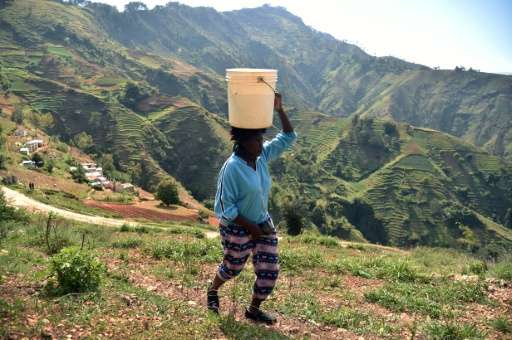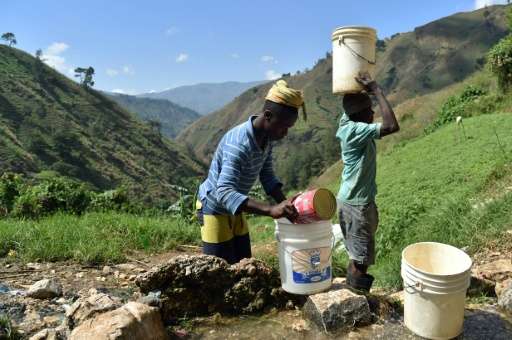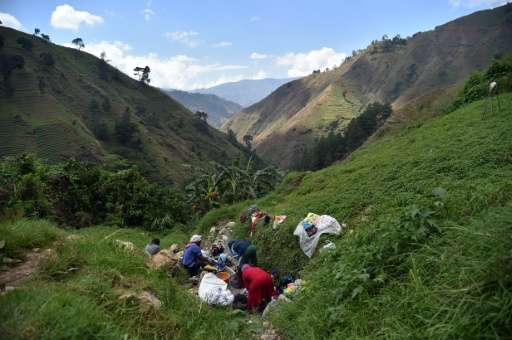Looking for clean water a never-ending task for many Haitians

Under the blazing sun in Haiti, Malinka Dorleus trudges up a hill with a 20-liter bucket of water on her head—a trip she makes up to four times a day.
From her village of Godet, the 15-year-old can see the sprawling villas belonging to the Caribbean country's elite, yet her family and neighbors have no access to running water.
"In the morning, I get two buckets of water that we use for cooking and drinking," the girl explains, breathless after walking up from the stream that serves several hundred villagers.
"In the afternoon, I come back again once or twice."
Godet is only 15 kilometers (9.3 miles) from Haiti's capital city of Port-au-Prince, but the lack of a proper road means the community of metal shacks and simple concrete homes is isolated and cut off from basic services.
Dorleus is not alone—the UN says 42 percent of Haitians do not have access to safe drinking water.
It's this lack of infrastructure that reinforces the cycle of poverty in Haiti, the poorest country in the Americas and one of the poorest in the world.
Catheline Metelus, who is 27 and was born in Godet, has been hauling water along this same path for years.
"It takes more than one hour to get up and down the hill with the water. Sometimes I'm too tired to go but I have no choice," she says.

Metelus, who earns a few dollars a week selling leeks from her garden, worries about the water's effect on the health of her three children.
"The doctor told us to always boil water to kill germs but that requires coal, which is expensive. Chlorine is also expensive so a lot of the time, we just drink it," she says.
Risk of disease
Mourad Wahba, the humanitarian coordinator of the UN mission to Haiti, said lack of water also means problems with sanitation, which can cause and spread disease.
"I know we immediately think of cholera but even diarrhea is dangerous in an environment where these illnesses aren't treated," he said.

Mothers here say their children frequently suffer from diarrhea caused by the water, and the most severely affected are sent to the hospital by motorcycle taxi.
Such a scenario can devastate the finances of a family in Godet, most of whom survive on their small gardens and informal jobs.
In Haiti, 72 percent of people do not have toilets in their homes. The number of toilets in Godet can actually be counted on one hand.
"There's a lady here who has a well-built toilet," Metelus said, pointing to a small concrete house a hundred meters (yards) away, "but it's not always open so we answer the call of nature on the hillside."
At the bottom of the hill lies the stream that is their only source of water, but poverty leaves few other options.
Meanwhile, a lack of education means many villagers do not understand the dangers of contaminating the stream with trash and chemicals.
Women washing clothes in the water reject the idea that they should do their work downstream.
"It's made from flowers, it's natural," 30-year-old Marie-Juna Pierre said, pointing to the label on her bottle of fabric softener.
She then poured the blue liquid into the very spot where she comes every morning to gather drinking water for her children.
© 2016 AFP















